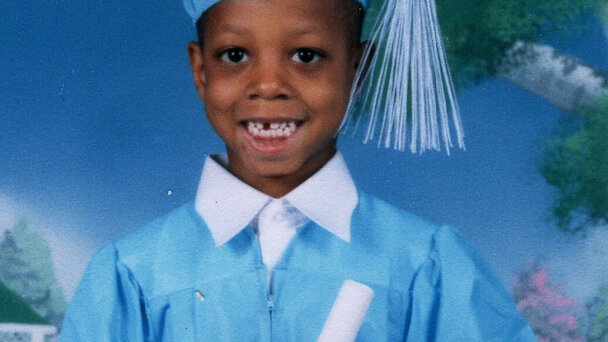
Kalief Browder, arrested at 16 on suspicion of stealing a backpack, held without trial in solitary for 3 years at Rikers. His story exposes injustice.
The Tragedy of Kalief Browder: A Harrowing Tale of Injustice
At just 16 years old, Kalief Browder’s life was shattered when he was arrested on suspicion of stealing a backpack. Wrongfully held without trial, Kalief spent 3 agonizing years in solitary confinement at Rikers Island, a fate that exposed the deep flaws in the criminal justice system. His tragic story highlights the devastating consequences of systemic injustice and the urgent need for reform.
De Tragiek van Kalief Browder: Een Schrijnend Verhaal van Onrecht
Op slechts 16-jarige leeftijd werd het leven van Kalief Browder verwoest toen hij werd gearresteerd op verdenking van het stelen van een rugzak. Onterecht vastgehouden zonder proces bracht Kalief 3 ondraaglijke jaren door in eenzame opsluiting op Rikers Island, een lot dat de diepe gebreken in het strafrechtelijk systeem blootlegde. Zijn tragische verhaal benadrukt de verwoestende gevolgen van systemische onrechtvaardigheid en de dringende noodzaak tot hervorming.
Kalief Browder’s siblings on new docu-series, calling for justice reform
“A School for Suicide”: How Kalief Browder Learned to Kill Himself During 3 Years at Rikers Jail
3 jun 2016
http://democracynow.org – Kalief Browder, who spent three years in jail in New York without ever being convicted of a crime, took his own life nearly one year ago, on June 6, 2015. In 2010, when Kalief was just 16, he was sent to Rikers Island on suspicion of stealing a backpack. He spent the next nearly three years imprisoned at Rikers, even though he was never tried or convicted. For nearly 800 days of that time, he was held in solitary confinement. A new piece in The New Yorker details how Kalief actually learned how to commit suicide at Rikers, after seeing another prisoner attempt to take his own life. The piece also details how, before taking his own life, Kalief recounted prison guards goading him on during suicide attempts, saying, “If you don’t jump, we’re going to go in there anyway, so you might as well go ahead and jump, go ahead and jump.” We speak with reporter and author Jennifer Gonnerman, who first recounted Kalief Browder’s story in 2014 in her article for The New Yorker, “Before the Law: A boy was accused of taking a backpack. The courts took the next three years of his life.” In her latest piece, Gonnerman details Browder’s experiences with suicide attempts at Rikers. “His description of Rikers and his time on Rikers was almost as if it were a school for suicide,” Gonnerman says.
Kalief Browder left home for a birthday party when he was 16.
When he came home three years later, he wasn’t the same person.
Police arrested the Bronx teenager on suspicion of stealing a backpack in 2010. Unable to afford $3,000 bail, Browder spent three years at Rikers Island jail complex in New York City — about two of which were spent in solitary confinement — awaiting a trial that never came. While there, he was starved and beaten, his brother said.
The charges against him eventually were dismissed and he was released in 2013. Less than two years after his release, haunted by his experiences in jail, Browder took his own life. His detention and death caused public outcry and spurred calls for reform, fueling national discussions about race, criminal justice and juvenile punishment.
In the years since, his brother, Akeem, has advocated for change. Last week, he brought the fight to Oklahoma.
“We want to see a change more than just saying this system is flawed,” Akeem Browder told reporters during a news conference Thursday at the state Capitol. “It’s not flawed. It was created to be this way. It was created to break families, to incarcerate and make black and brown people across this nation look like the criminals and the felons and the convicts that we’re not. We’re human beings just like everyone else, and it’s time that change comes.”
A report released earlier this year by Open Justice Oklahoma showed that Oklahomans accused of nonviolent offenses often spend several weeks in local and county jails because they’re unable to afford to post money bond.
Last legislative session, Oklahoma lawmakers considered a bill to reform the bail process that advocates said would have ended the practice of “unnecessary and expensive” pretrial detention for most people with misdemeanor and nonviolent felony charges, allowing those individuals to return to their families and jobs while waiting for their day in court. The measure failed to clear the Oklahoma House.
Thursday night, Browder shared his brother’s story during a forum at Langston University organized by the university’s student chapter of the National Association of Blacks in Criminal Justice.
“My brother didn’t deserve this, and a lot of people suffer the injustice of going into places that they don’t belong and they shouldn’t have been accused but they fit the description of someone that looks like them,” Akeem Browder said. “Sometimes … because you don’t even have to look like the perpetrator. You just have to be in the wrong place at the wrong time.”
During the forum, a panel that included a judge, a representative from the American Civil Liberties Union of Oklahoma, the ex-officio chair of the governor’s RESTORE criminal justice task force, and a Board of Corrections member, discussed a variety of topics, including mental health, re-entry, predatory lending and Pell grants.
Letina McLeod, president of the National Association of Blacks in Criminal Justice student chapter and Alpha Phi Sigma Criminal Justice Honor Society on campus, said she was inspired to take action after she saw “TIME: The Kalief Browder Story,” a six-part documentary series co-produced by rapper Jay-Z.
“For many years, we’ve chosen to just lock people up when accused of wrongdoings,” she said. “I’m a believer that not all individuals have a criminal mindset. For some, there are no options. For others, there are mental health issues that may be in question, yet they are automatically incarcerated without the issues being addressed, leaving them to fall under the injustices of the justice system.”
Akeem Browder told the audience his brother just wanted to be heard. His mom, who died of a heart attack the year after Kalief’s death, wanted justice. His goal, he said, is to bring about change.
“Action is the only thing that’s going to avoid having another Kalief Browder,” he said. “We cannot suffer another injustice. Every day that goes by, even right now while we’re here, another Kalief Browder is happening just because we haven’t stopped the system — we’re talking about the system.”
Advocate for criminal justice reform shares his family’s story
Darla Slipke | Oklahoman
LANGSTON —
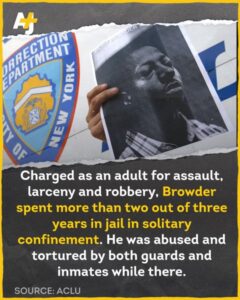
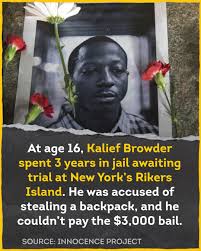
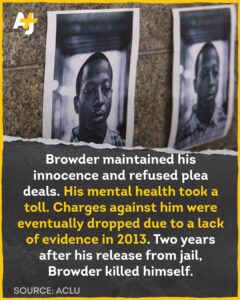
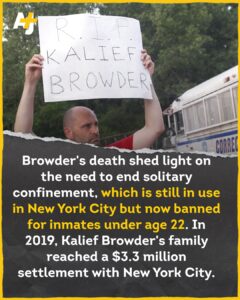
Kalief Browder’s Life Behind Bars and Who He Might Have Been
TIME: The Kalief Browder Story Trailer
It is indeed a heartbreaking and shocking story
that highlights the deep flaws within the justice system.
His tragic experience is a stark reminder of the devastating effects
of wrongful incarceration and the importance of advocating for reform.
It’s incredibly moving when a story like his resonates so deeply.
Producers And Creators Of “TIME: The Kalief Browder Story” Talk About The Documentary
1 mrt 2017
The series, executive produced by Shawn “Jay Z” Carter and Harvey Weinstein, tells the powerful & heartbreaking story of Kalief Browder, a 16-year-boy who was arrested for allegedly stealing a backpack, never convicted of anything in relation, yet spent at least 800 DAYS IN SOLITARY CONFINEMENT, AND MORE THAN 1,000 DAYS IN THE NOTORIOUS RIKER’S ISLAND PRISON. The docu-series dives deep into the sad truth of racial inequality within the U.S. criminal justice system. Join Nick Sandow (Joe Caputo of “Orange Is The New Black”), director/creator Jenner Furst & creator/exec producer Julia Willoughby Nason as they discuss the series. Interview at 692 Broadway in NYC for BUILD Series.
BUILD is a live interview series like no other—a chance for fans to sit inches away from some of today’s biggest names in entertainment, tech, fashion and business as they share the stories behind their projects and passions. Every conversation yields insights, inspiration and plenty of surprises as moderators and audience members ask questions. It all happens several times a day live and live-streamed on BUILDseries.com.
Kalief Browder’s mom on his life, legacy, and tragic suicide
Very Important to listen: listen to the deeper content
Very Important to listen: listen to the deeper content
Accused of Stealing a Backpack, High School Student Jailed for Nearly Three Years Without Trial
http://democracynow.org – We look at the incredible story of how a 16-year-old high school sophomore from the Bronx ended up spending nearly three years locked up at the Rikers jail in New York City after he says he was falsely accused of stealing a backpack. Kalief Browder never pleaded guilty and was never convicted. Browder maintained his innocence and requested a trial, but was only offered plea deals while the trial was repeatedly delayed. Near the end of his time in jail, the judge offered to sentence him to time served if he entered a guilty plea, and warned him he could face 15 years in prison if he was convicted. But Browder still refused to accept the deal, and was only released when the case was dismissed. During this time, Browder spent nearly 800 days in solitary confinement, a juvenile imprisonment practice that the New York Department of Corrections has now banned. We are joined by reporter and author Jennifer Gonnerman, who recounts Browder’s story in the current issue of The New Yorker. We also speak with Browder’s current attorney, Paul Prestia, who has filed a lawsuit against the City of New York, the New York City Police Department, the Bronx District Attorney, and the Department of Corrections, on Browder’s behalf.
‘TIME: The Kalief Browder Story’ Press Conference with Jay Z
Akeem Browder: The Kalief Browder Story – 3/26/23
27 mrt 2023
Akeem joined us to discuss the effects of solitary confinement and incarceration at Rikers Island, and the other inhumane conditions Kalief was subjected to, that stood in stark contrast to the vibrant teenager Kalief was prior to his arrest and wrongful incarceration.
Akeem discussed the work being done in Kalief’s legacy, including the Obama administration’s ban on solitary confinement for minors in federal prisons, New York’s “Raise the Age” law, and the various criminal justice reform laws passed in Kalief’s name. He also discussed the work of the Kalief Browder Foundation and how everyone can be involved.
Kalief Browder (Nightline)
Important
Kalief Browder’s Lawyer: Incarceration Was ‘Direct Cause’ Of Client’s Death
Kalief Browder, who was held at Rikers Island for three years without a trial, committed suicide on Saturday. We speak with his lawyer, and then discuss why Rikers is emblematic of everything that’s wrong with the criminal justice system.
Exhibition sheds light on Kalief Browder’s years in solitary confinement
Sixteen-year-old Kalief Browder spent three years inside New York City’s Rikers Island without being convicted of a crime, enduring two of those years in solitary confinement. He subsequently struggled with his mental health and eventually took his own life. A new exhibition at the artist space “Pioneer Works” in Brooklyn called “Kalief Browder: The Box” seeks to shed light on Browder’s strength in the face of his long periods in solitary confinement. Ivette Feliciano reports.
Kalief Browder’s Mother Dies Of Broken Heart | BET Breaks
Her lawyer feels she died of a broken heart.
Kalief Browder’s mom on his life, legacy, and tragic suicide
1 feb 2016
An interview with Mrs. Venida Browder about her son, Kalief, who suffered through three years on Rikers Island awaiting trial.
Mrs. Venida Browder, Mother of Kalief Browder
Paul V. Prestia, Esq., The Prestia Law Firm PLLC
Moderated by: Juju Chang, ABC News
Venida Browder: ‘I Miss My Son,’ Kalief | We Are Witnesses
17 okt 2016
On March 10, 2026, Venida Browder spoke with us about her son, Kalief Browder. “I miss my son. I miss him so much.”
Months later, Venida Browder died from complications of a heart attack.
“We Are Witnesses” is a video project created by The Marshall Project that shares voices of Americans whose lives have been entangled with the criminal justice system.
TIME: The Kalief Browder Story – Timeline Infographic
Tragedy Of ‘Time: The Kalief Browder Story’ | AM Joy | MSNBC
Kalief Browder’s Lawyer, Paul Prestia Speaks on The Case, Rikers Island & Kalief Taking His Life
Kalief Browder & The Business of Civil Rights Attorneys | shift | msnbc
Akeem Browder On Running For NYC Mayor, Kalief & Past
Shut Down Rikers: Meet Akeem Browder, Fighting to Close the Jail That Took His Brother’s Life
http://democracynow.org – We continue our coverage of Rikers Island. In October, the Browder family held a memorial service for Venida Browder, who died “of a broken heart” 16 months after her own son, Kalief, hanged himself in his Bronx home after spending nearly three years at New York’s Rikers Island jail. In 2010, when Kalief was just 16, he was sent to Rikers Island, without trial, on suspicion of stealing a backpack. He always maintained his innocence and demanded a trial. He spent the next nearly three years at Rikers, even though he was never tried or convicted. For nearly 800 days of that time, he was held in solitary confinement. Near the end of his time in jail, the judge offered to sentence him to time served if he entered a guilty plea, and told him he could face 15 years in prison if he went to trial and was convicted. Kalief still refused to accept the plea deal. He was only released when the case was dismissed. While in Rikers, Kalief was repeatedly assaulted by guards and other prisoners. He also told Huffington Post Live that he was repeatedly denied food by guards while he was in solitary confinement. These experiences traumatized him, and ultimately, after his release, Kalief Browder took his own life on June 6, 2015, when he was 22 years old. For more, we speak with Akeem Browder, Kalief’s older brother. He is the founder of the Campaign to Shut Down Rikers.
Time – The Kalief Browder Story Review
KHALIEF BROWDER: HELL ON EARTH (RIKERS ISLAND)
Two Years After Kalief Browder’s Suicide, His Brother Recounts Horrifying Ordeal at Rikers
Back to menu IMPORTANT CONTENT – Highly recommended listening.
6 jun 2017
https://democracynow.org – Today marks two years since Kalief Browder took his own life in 2015 at the age of 22, after being held in jail for nearly three years without trial for a crime he did not commit.
In November, we spoke with Akeem Browder, Kalief’s older brother. He is the founder of the Campaign to Shut Down Rikers. Today we share a second part of his interview that has never been broadcast before. We spoke with him shortly after his family held a memorial service for Venida Browder, who died “of a broken heart” 16 months after her son hanged himself in his Bronx home.
Kalief was just 16 years old in 2010 when he was sent to Rikers Island jail in New York City on suspicion of stealing a backpack. He always maintained his innocence and demanded a trial. Instead, he spent the next nearly three years at Rikers—nearly 800 days of that time in solitary confinement. Near the end of his time in jail, the judge offered to sentence him to time served if he entered a guilty plea, and told him he could face 15 years in prison if he went to trial and was convicted. Kalief still refused to accept the plea deal. He was only released when the case was dismissed. While in Rikers, Kalief was repeatedly assaulted by guards and other prisoners. His brother explains in this interview that he was repeatedly denied food by guards while he was in solitary confinement.
Democracy Now! is an independent global news hour that airs weekdays on nearly 1,400 TV and radio stations Monday through Friday. Watch our livestream 8-9AM ET: https://democracynow.org
Voices from NYC’s Most Notorious Jail: Former Prisoners Speak Out About Abuse at Rikers Island
2 nov 2016
http://democracynow.org – A new PBS documentary, “Rikers,” brings you face to face with men and women who have survived incarceration at New York City’s largest and most notorious jail. Their stories are told directly to the camera without any additional narration. A dozen former inmates vividly describe the cruel arc of the Rikers experience—from the trauma of entering the island to the extortion and control exercised by other inmates, to the harrowing interactions with corrections officers. They also detail the beatings and stabbings, the torture of solitary confinement and the psychological difficulties of re-entering the outside world. For more, we’re joined by award-winning independent filmmaker Marc Levin, director of the new documentary, “Rikers.”